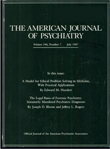Anticipation of Age at Onset in Panic Disorder
Abstract
OBJECTIVE: Anticipation (i.e., the decrease in age at onset or the increase in severity of a disorder in successive generations) has recently been reappraised as a key to understanding the genetics of some familial illnesses. The purpose of this study was to search for possible anticipation in panic disorder. METHOD: Thirty-eight unilineal, multigenerational families with multiple directly interviewed members who had panic disorder were compared across two successive generations for 1) age at the first panic attack, 2) age at the onset of panic disorder, and 3) the highest degree of agoraphobia ever experienced, as a tentative index of severity of illness. Intergenerational pairwise comparisons were implemented according to four different sampling schemes: random pairs, random transmitting pairs, all possible pairs, and all possible transmitting pairs. RESULTS: Life table analyses showed a significant decrease in the time before the first episode of panic and onset of panic disorder from the older to the younger generation. Evidence for anticipation was found for both indexes of onset in all four sampling schemes. No evidence of a generational effect on the index of severity of agoraphobia was found. Corrections for possible biases suggested that these results are not likely to be simple artifacts. CONCLUSIONS: Anticipation is supported in this specific set of families and, if it is confirmed by other studies, a role for trinucleotide repeat sequences may be considered to account for the familial aggregation of panic disorder.



